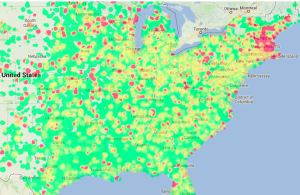
Jean Lievens: Noam Chomsky on Education
Culture, Education, Governance, Innovation, KnowledgeJean Lievens: Vision for a Data Commons
Cloud, Data, Governance, Innovation, Knowledge, P2P / Panarchy, Resilience, Transparency
Our Vision
People everywhere have been organizing a more ethical economy, but they work in relative isolation, fragmented by geography, sector, and even organizational form.
Many organizations collect information about a small piece of these efforts. In every situation, there is another organization for which that information overlaps. In every case there is an opportunity to share that will strengthen all the organizations participating.
Sharing requires effort, it requires trust, and it requires infrastructure. The Data Commons is a cooperative of organizations that are sharing – sharing the costs of this effort, trusting each other with their information, and building infrastructure to make sharing is easy.

Members of the Data Commons Cooperative are principled economic organizations that want it to be easy to share with each other, and with the world, in the movement for a more ethical economy.
Examples of information overlap

Uniting the movements
Patrick Meier: Twitter as a Community Nervous System
Crowd-Sourcing, Culture, Data, Geospatial, Governance, P2P / Panarchy, Politics, Resilience, Transparency
Taking the Pulse of the Boston Marathon Bombings on Twitter
Social media networks are evolving a new nervous system for our planet. These real-time networks provide immediate feedback loops when media-rich societies experience a shock. My colleague Todd Mostak recently shared the tweet map below with me which depicts tweets referring to “marathon” (in red) shortly after the bombs went off during Boston’s marathon. The green dots represent all the other tweets posted at the time. Click on the map to enlarge. (It is always difficult to write about data visualizations of violent events because they don’t capture the human suffering, thus seemingly minimizing the tragic events).

Visualizing a social system at this scale gives a sense that we’re looking at a living, breathing organism, one that has just been wounded. This impression is even more stark in the dynamic visualization captured in the video below.
Tom Atlee: Surveillance and parasitism harm society’s collective intelligence
Crowd-Sourcing, Design, Economics/True Cost, Education, Governance, Innovation, Knowledge, P2P / Panarchy, Politics, Resilience, Security, Sources (Info/Intel), Transparency
Surveillance and parasitism harm society’s collective intelligence
What this post is about: Society’s collective intelligence needs to be able to see clearly what’s going on and take action about it. Both NSA surveillance and corporate suppression of activism interfere with that vital dynamic. This post clarifies what’s going on in these dynamics and suggests strategies to counter them and increase society’s collective intelligence.
Any healthy living system will try to weed out challenges that threaten its functioning. That’s what immune systems do: they preserve business-as-usual in a body.
But this natural maintenance activity of a system can be counterproductive:
(a) when changing circumstances demand adaptive responses, when the system NEEDS to change its business-as-usual – and
(b) when the system has been parasitized by something that is using it for the parasite’s own purposes at the larger system’s expense.
Entire post below the line, with links.
Continue reading “Tom Atlee: Surveillance and parasitism harm society’s collective intelligence”
Jean Lievens: The Sharing Economy — Whole Living
Crowd-Sourcing, Design, Governance, Innovation, Mobile, Money, P2P / Panarchy, Politics, Resilience, Spectrum, Transparency
The sharing economy: a whole new way of living
From accommodation to cars, the internet is turning us from consumers into providers and challenging established business models. We talk to Martin Varsavsky, founder of Fon – the largest Wi-Fi company in the world – and profile two more pioneers, from TaskRabbit.com and BlaBlaCar.com
In 2006, serial entrepreneur and investor Martín Varsavsky – inspired by a conviction that he could cloak the world in free Wi-Fi by encouraging people to share their home connections – founded Fon in Madrid. The company is now the largest Wi-Fi network in the world, with almost 12m hot spots in more than 100 countries.
“My general thinking at the time was that we live in a world in which benefits are only accrued through economic growth and the endless consumption of resources, and that there have to be other ways that are of more benefit to people,” he says. “Why should everyone have their own car when most of the time they are not using them? Think of a marina full of boats. How frequently do those boats go out?”
Today, it has been argued that the sharing economy – which is perhaps best defined as a way of sweating underutilised assets, by building communities around them and turning consumers into providers – has the potential to reboot businesses across most economic categories. Indeed, Forbes magazine recently estimated that total revenues for the sector could top $3.5bn this year, with growth exceeding 25%. However, when setting up Fon, Varsavsky became convinced that people needed a nudge or financial incentive before they'd happily share their assets.
Mini-Me: Give Every Afghan a Radio? Or Give Every Afghan OpenBTS with a Radio App? + OpenBTS Meta-RECAP
BTS (Base Transciever Station), Crowd-Sourcing, Design, Education, Governance, Hardware, Innovation, Mobile, P2P / Panarchy, Politics, Resilience, Software, Spectrum
Huh?
Overheard in the World Cafe:
Speaker A: My friend is creating a wide-area radio network for Afghanistan.
Speaker B: Afghanistan has no infrastructure — including radio stations. Although radio is popular, it is mostly shortwave, with a few local FM stations for the local Iman. And electricity for radio stations is spotty at best including in Kabul.
Speaker A: Well, I can build really cheap, “ultra” cheap, radio receivers.
Speaker B: As long as you are doing that, why not give them OpenBTS cell phones running on ambient energy, and include a radio app? Then get someone else — Google, Virgin Mobile, the Chinese or India — to focus on all-purpose cellular towers and tethered ballons?

